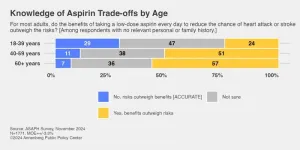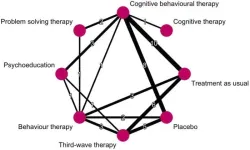(Press-News.org) Alarming Rise in Rates of Advanced Prostate Cancer in California
Following a change in screening guidelines, the incidence went up across the state, even more than it has nationally.
The incidence of advanced prostate cancer in California rose markedly in the decade since doctors stopped routinely screening all men for the disease, according to a new study by UC San Francisco.
After declining for many years, the death rate from the disease also plateaued in most regions across the state.
The findings reinforce the need for screening that can identify potentially fatal tumors without raising false alarms about ones that pose no threat to the patient.
The study appears Jan. 27 in JAMA Network Open.
“This overall rising trend is alarming and has occurred across age groups, regions of California, races and ethnicities,” said lead author Erin L. Van Blarigan, ScD, UCSF associate professor of Epidemiology & Biostatistics and Urology.
“Our data point to how urgent this problem is,” said Van Blarigan, who is also with the UCSF Helen Diller Family Comprehensive Cancer Center. “Figuring out the best way to screen for prostate cancer continues to be a challenge for researchers and doctors. Without screening, the number of men diagnosed with advanced prostate cancer – when treatments are less effective – increases fast.”
The challenge of screening for prostate cancer
Among men in the U.S., prostate cancer is the most common cancer and second-leading cause of cancer deaths. While some tumors are aggressive and can lead to death, the majority are low-grade and never spread.
The most frequently used screening tool is PSA testing (prostate specific antigen), which does not differentiate between aggressive or non-aggressive tumors, leading many men to be diagnosed with cancers that would not hurt them in the long run.
On the other hand, if screening isn’t done, timely diagnosis of more advanced cancers can be missed – those cancers might have been successfully treated if found early.
After years of screening all men for prostate cancer, the U.S. Preventative Services Task Force stopped recommending it in 2012. They hoped to prevent unnecessary and potentially harmful interventions, like surgery, for men whose disease was not serious.
In 2018, they began recommending that men between the ages of 55 and 69 discuss possible benefits and harms of screening with their doctors. But, as the authors note, this may not always be happening.
Prostate cancer mortality stops falling
UCSF researchers analyzed data involving nearly 388,000 men with prostate cancer in California between 2004 and 2021. Almost 28,000 (7.2%) had advanced disease, which has a five-year survival rate of just 37%. During the study timeframe, there were 58,754 deaths from prostate cancer.
Investigators looked at 10 regions spanning the state to see if rates in certain areas were increasing faster or slower.
They found that serious disease, which had been stable or dropping until 2010, grew 6.7% a year from 2011 to 2021. By contrast, national rates grew by 4.5% a year from 2011 to 2019. The lowest annual increase was in the Southern San Joaquin Valley (2.3%), the highest was in the Central Coast (9.1%).
Prostate cancer mortality dropped by 2.6% a year between 2004 and 2012; but after that, it plateaued in 7 out of 10 regions in the state. Mortality was highest in the Inland Empire followed by San Diego-Imperial and North Coast. It was lowest in the San Francisco Bay Area.
“It’s important to continue monitoring prostate cancer trends both in California and nationally as we learn more about the impact of screening guidelines on different populations,” said senior author Scarlett L. Gomez, PhD, MPH, UCSF professor in the Department of Epidemiology & Biostatistics.
Additional authors: Meg A. McKinley, MPH; Samuel L. Washington III, MD, MAS; Matthew R. Cooperberg, MD, MPH; Stacey A. Kenfield, ScD; and Iona Cheng, PhD, all with UCSF.
Funding: California Department of Public Health; Centers for Disease Control and Prevention’s National Program of Cancer Registries (1NU58DP007156); the National Cancer Institute’s Surveillance, Epidemiology and End Results Program (HHSN2612018000321, HHSN2612018000151, HHSN2612018000091).
Disclosures: Please see the paper.
About UCSF: The University of California, San Francisco (UCSF) is exclusively focused on the health sciences and is dedicated to promoting health worldwide through advanced biomedical research, graduate-level education in the life sciences and health professions, and excellence in patient care. UCSF Health, which serves as UCSF's primary academic medical center, includes top-ranked specialty hospitals and other clinical programs, and has affiliations throughout the Bay Area. UCSF School of Medicine also has a regional campus in Fresno. Learn more at ucsf.edu, or see our Fact Sheet.
###
END
Alarming rise in rates of advanced prostate cancer in California
2025-02-03
ELSE PRESS RELEASES FROM THIS DATE:
Nearly half of adults mistakenly think benefits of daily aspirin outweigh risks
2025-02-03
For years, healthy older adults were advised by doctors to take a low-dose aspirin daily as a way to reduce the risk of heart attack. But in March 2019, the American College of Cardiology and the American Heart Association (AHA) announced new guidelines and no longer routinely recommended a daily dose of aspirin for healthy adults over the age of 70 because the risk of gastrointestinal bleeding outweighs the benefits.
Nearly five years later, many Americans still have not received the message.
The Annenberg Public Policy Center (APPC) of the University of Pennsylvania finds in a new health survey that nearly half (48%) of U.S. ...
Cardiovascular disease medications underused globally
2025-02-03
Secondary prevention medications for cardiovascular diseases (CVD) are underused globally and additional strategies to increase their use are needed to improve CVD management and reduce premature mortality rates, according to study published today in JACC, the flagship journal of the American College of Cardiology. The study observed participants with CVD from 17 countries over 12 years and found that medication use remains low with little improvement.
Secondary prevention of CVD focuses on preventing further health problems in people already diagnosed with CVD. This includes managing risk factors through lifestyle changes, medications and ...
Amazon Pharmacy's RxPass program improves medication adherence, helps prime members save money, study finds
2025-02-03
Approximately half of all Americans do not take their medication as prescribed by their doctor. This medication non-adherence causes an estimated 125,000 additional deaths and as much as $300 billion a year in additional medical appointments, emergency department visits, and hospitalizations.
A new study published in the Journal of the American Medical Association (JAMA) Network Open finds Amazon Pharmacy’s subscription service for common medications, RxPass, leads to significant improvements in medication adherence while reducing out-of-pocket costs for patients. This first-of-its-kind study evaluated the potential of subscription models to support prescription medication access ...
Tufts University School of Medicine, ATI Physical Therapy launch first-of-its-kind collaboration to make physical therapy education and career advancement more accessible and affordable
2025-02-03
With demand for physical therapy services projected to increase 27 percent by 2030, Tufts University School of Medicine (TUSM) and ATI Physical Therapy (ATI), a leading provider of physical therapy services across the United States, are launching a joint initiative aimed at expanding the physical therapist workforce and making the Doctor of Physical Therapy (DPT) Programs at TUSM more accessible.
As part of the first-of-its-kind collaboration, TUSM and ATI will contribute scholarships each semester for up to 45 ATI employees in TUSM’s DPT programs each academic year. The accelerated ...
Could lycopene—a plant extract—be an effective antidepressant?
2025-02-03
Emerging evidence suggests that lycopene—a natural plant extract—may have antidepressant properties. New research in Food Science & Nutrition reveals the mechanisms behind its antidepressant effects.
In mice with depressive-like behaviors, brain analyses revealed impairments in the hippocampus. Lycopene treatment lessened these impairments and reversed the animals’ depressive-like traits.
Lycopene treatment boosted the expression of brain-derived neurotrophic factor (BDNF), a protein with roles in many aspects of brain function. Experiments indicated that a signaling pathway involving BDNF (called the BDNF-TrkB pathway, ...
Study shows urine test for prostate cancer could be used at home
2025-02-03
Researchers at Vanderbilt and the University of Michigan have shown that a simple at-home urine test for prostate cancer screening is highly accurate. The exciting new results, published in The Journal of Urology, build upon a prior Vanderbilt study of prostate cancer screening that required a digital rectal exam.
The results are important because this could enable at-home testing and increased access to testing for patients undergoing telehealth care or living in remote areas.
Traditional prostate cancer screening with PSA testing and biopsy has been shown to lead to unnecessary procedures and overdiagnosis of low-grade cancers, according to ...
Shaping future of displays: clay/europium-based technology offers dual-mode versatility
2025-02-03
The world of display technology is on the cusp of a transformative breakthrough, with electrochemical stimuli-responsive materials gaining more attraction. Based on external stimuli, such as low voltage, these materials can instantaneously undergo electrochemical reactions. These electrochemical reactions can result in the production of different colors, revolutionizing the age of display solutions. An electrochemical system consists of electrodes and electrolytes. Combining the luminescent and coloration molecules on the electrodes instead of the electrolyte can offer higher efficiencies and stability for display devices.
To this end, a research team ...
Optimizing ADHD treatment: revealing key components of cognitive–behavioral therapy
2025-02-03
Attention-deficit hyperactivity disorder (ADHD) is a well-known neurodevelopmental disorder that affects the brain's ability to regulate attention and control impulses. It poses many challenges to those affected, typically making it difficult for them to sustain focus, follow through with instructions, and maintain a calm and restful state. As one of the most common neurodevelopmental disorders, ADHD impacts individuals throughout their lives, creating a breadth of social, emotional, academic, and workplace challenges.
Despite its high ...
Breaking barriers in thioxanthone synthesis: a double aryne insertion strategy
2025-02-03
Thioxanthones are fascinating organic compounds that have found their way into many industrial and everyday applications. In the printing industry, for example, they help inks dry faster when exposed to light thanks to their light-absorption properties, making the printing process quicker and more efficient. Some thioxanthones have been developed into FDA-approved drugs used to treat parasitic infections and cancer. Additionally, their effectiveness as photocatalysts has led some researchers to explore their potential as stabilizers against electrical breakdown. Thioxanthones have also been ...
Houston Methodist researchers identify inhibitor drugs to treat aggressive breast cancer
2025-02-03
A national study seeking more effective treatment for deadly metaplastic breast cancer has identified two inhibitor drugs with the potential to interrupt disease progression.
Houston Methodist and a team of researchers from across the country examined the biology of metaplastic breast cancer, comparing it to non-metaplastic triple negative breast cancer. They discovered metaplastic breast cancers typically exhibit two unique signaling pathways in their cell interaction. Researchers were able to disrupt these pathways using a class of inhibitors typically used to treat advanced ...






